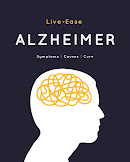Alzheimer’s Disease
Similarly the human brain works. It is one of the most vital organs of body which coordinates all organs, hormones, actions, and metabolism and also guides body for the most desired state.
The cells in human brain are immortal and does not undergo division further once formed or matured. Thus, any type of disease affecting these cells is very harmful for whole body functioning. One of those diseases is ALZHEIMER’S DISEASE.
What is Alzheimer’s disease?
Alzheimer’s disease is a neuro-degenerative progressive disease, which affects the human brain resulting in distortion of memory and leads to large scale harm for mental status.
The disease begins slowly and progressively becomes worst, leading to death. Most probably it affects the age group of more than 65, but in some rare cases it might occur or begin at 40 years of age.
How Alzheimer’s disease does occur?
The Alzheimer’s disease mainly occurs due to the abnormal or irregular or should say the excess of building up of two types of proteins in and around the human brain which clogs or blocks the brain cells leading them to shrink and dysfunction.
The first protein type which plaque around brain cells is AMYLOID, which is primary and most viable for the damage and the second protein, is TAU. The Tau protein tangles up the cells inside the brain.
The beginning of the disease is still unknown, but it begins much before or many years before the symptoms occur to be noticed.
The disease affects brain cells mainly and thus also the
neurotransmitters which transfers the messages and impulses to and fro the
brain. The disease levels down the most important neurotransmitter in body
called ACETYLCHOLINE.
The Alzheimer’s disease could also occur genetically or due to any patient in family history. And thus, it is also called as autosomal dominant disease. Such types of patients show symptoms at early age and hence known as Early Onset Familial Alzheimer’s Disease.
What are the symptoms of Alzheimer’s disease?
The most firstly occurring symptoms are difficulty of memory or language or vision. Other symptoms which may occur are:
· Tough to remember the recent events.
· Hallucination.
· Confusion in speaking.
· Loss of appetite.
· Swinging of moods every now and then.
· Disorientation or lost anywhere.
· Self-neglecting.
· Lack of motivation.
· Socially isolating one-self.
Who are at high risk of Alzheimer’s disease?
There are a certain group of individuals who should act as over protective towards several diseases and they are referred as at the high risk of getting diseased. Those who are at high risk of getting Alzheimer’s disease are:
· Those who have crossed 65 are at high risk as the chances doubles with next 5 years.
· While, who had a family history of Alzheimer’s disease could get it early, at around 40 years of age.
· A patient of DOWN’S SYDROME could get it fast as the existing genetic fault can increase the plaque of amyloid protein which leads to Alzheimer’s disease.
· If any one have ad any type of serious head injuries due to some accident. This high risk factor is under research till now.
· Any type of Cardio-Vascular Disease attracts the Alzheimer’s disease.
· Other life style factors like smoking, alcoholism, high blood pressure, obesity, high cholesterol etc could act as kerosene to fire.
· Dementia leads to Alzheimer’s disease.
· Deficiency of Vitamin-D.
· Long term depression or stress.
A person suffering from Alzheimer’s disease could typically live for 3-9 years after the occurrence of symptoms.
What is the treatment for Alzheimer’s disease?
Till date no cure or treatment is known for the Alzheimer’s disease. No treatment is available which could reverse back the condition of the patient or makes the brain as it was, that is a healthy human brain.
But there are some medications or strategies that could decrease the suffering or difficulties faced by the patient. Medications like cognition-enhancing medication are prescribed by the physicians in such conditions.
Also self care has the most vital role to play.
Whom to visit if suffering from Alzheimer’s disease?
A person suffering from Alzheimer’s disease can visit the following health care providers:
· Therapist.
· Neurologist.
· Psychiatrist.
· Geriatrician.
Or the most nearest health care unit available.
What are the precautions for Alzheimer’s disease?
Every disease could be fought if one knew how to fight. Here are some precautions or should say the preventive measures to lessen the sufferings or gain immunity to fight against:
· Quit smoking.
· Avoid alcohol.
· Be physically and mentally active.
· Have a balanced diet loaded with nutrients.
· Exercise at least 20-25 minutes daily for 5 days per week.
· Have regular health check-ups.
· Keep monitoring blood pressure or sugar levels if have diabetes or hypertension.
· Keep one self busy most of the time.
· Avoid self isolation or being alone.
· Avoid stress as much as one could.
And last but not the least, live a fruit full life; every one is not lucky to have those years which you got. Don’t waste them in stress or depression.

